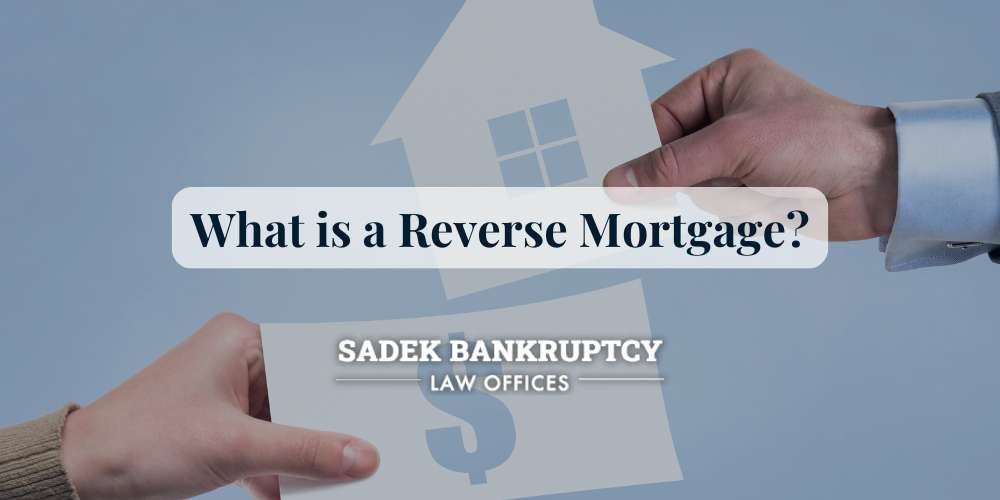Homeowners across Pennsylvania and New Jersey struggling financially in retirement may ask, “What is a reverse mortgage?“ This type of home loan is often marketed as a way for older homeowners to borrow money against the equity they’ve built over the years without selling their homes or making monthly payments. While that sounds appealing, the reality is more complicated. If not carefully managed, a reverse mortgage loan can lead to foreclosure, a rising loan balance, and even bankruptcy.
A reverse mortgage may seem practical, but it’s not the right choice for everyone. Unlike a traditional mortgage or standard home loan, reverse mortgages require homeowners to stay current on property taxes, maintain homeowners’ insurance, and keep the home in good condition. If these obligations are missed, borrowers may face serious legal consequences.
At Sadek Bankruptcy Law Offices, we help clients throughout Pennsylvania and New Jersey understand their legal and financial options when dealing with mortgage loan issues. Led by Attorney Brad J. Sadek, our firm has over 20 years of experience guiding families through foreclosure defense, bankruptcy, mortgage modifications, and reverse mortgage counseling. We understand how these home loan decisions affect your future, as well as your family’s future.
For trusted advice and personalized service from experienced Philadelphia bankruptcy lawyers, contact us online or call us today: PA: (215) 545-0008 / NJ: (856) 890-9003.
What are Home Equity Conversion Mortgages (HECMs)?
Home Equity Conversion Mortgages, or HECMs, are a type of reverse mortgage loan insured by the Federal Housing Administration. These loans allow older homeowners to borrow money using the equity in their primary residence. HECM borrowers can choose how they receive funds: lump sum, monthly payments, or a line of credit.
HECM reverse mortgages are the most common type of reverse mortgage in the U.S. Unlike proprietary reverse mortgages, which are backed by private lenders, HECMs are regulated by the federal government through the Department of Housing and Urban Development (HUD). Reverse mortgage counseling is required before closing on an HECM loan, and certified housing counselors help borrowers understand their rights and obligations.
How Does a Reverse Mortgage Work?
Reverse mortgages work differently than a traditional mortgage or home loan. Instead of making monthly mortgage payments to a lender, senior citizens who qualify for a reverse mortgage receive loan proceeds based on their available home equity. These proceeds can be paid out as a lump sum, line of credit, monthly disbursements, or a combination of these options. Over time, the loan balance increases as interest, servicing fees, and the required mortgage insurance premium are added to the principal amount.
Borrowers continue to own their homes and retain title to the property. Still, the reverse mortgage loan becomes due and payable when the last borrower either passes away, permanently moves out of the home, or sells the property. At that point, the loan must be repaid, typically through the sale of the home. If the borrower fails to meet certain obligations, such as paying property taxes, maintaining homeowners’ insurance, or keeping the home in good condition, they may face foreclosure.
Funds from a reverse mortgage can be used to pay off an existing mortgage, cover medical expenses, finance home repairs, or simply support daily living costs. The federal government requires that all prospective borrowers understand the full scope of the loan, including how the rising loan balance can affect future home equity and inheritance planning.
Eligibility Requirements for Reverse Mortgage Loans
To qualify for a reverse mortgage loan, the borrower must:
- Be 62 years of age or older
- Own the home outright or have a low existing mortgage balance
- Live in the home as a primary residence for more than half of the year
- Complete reverse mortgage counseling with a HUD-approved housing counselor
- Stay current on homeowner’s insurance and property taxes
- Maintain the home according to FHA guidelines
Loan proceeds are not unlimited. The amount available depends on the type of reverse mortgage, home value, and other assets. Most reverse mortgages require the property to meet HUD standards, and the borrower must demonstrate financial ability to pay property taxes and related costs.
Pros and Cons of Reverse Mortgages
Reverse mortgages offer several benefits but also come with risks and costs that homeowners should weigh carefully.
Pros:
- No monthly mortgage payments are required, freeing up cash flow.
- Borrowers can access cash through a line of credit, lump sum, or monthly disbursements, which can help them save money on other expenses.
- It can help pay off an existing mortgage or other debts late in life.
- Useful for home repairs or medical expenses that arise during retirement.
Cons:
- A rising loan balance can erode home equity over time.
- Borrowers must still pay property taxes, homeowner’s insurance, and maintain the home (failure to do so can result in foreclosure).
- High origination fees, an application fee, mortgage insurance premiums, servicing fees, and other costs can significantly add to the loan balance.
- It may reduce assets left to heirs and limit inheritance.
- Not all financial institutions charge the exact fees, and terms vary widely between lenders. It pays to shop around.
Understanding how reverse mortgages work and the total financial picture, including all costs, is essential before signing any loan documents. At Sadek Bankruptcy Law Offices, we help reverse mortgage borrowers and heirs examine the pros, cons, and closing costs so they can make informed decisions that match their long-term goals.
Reverse Mortgage Tax Implications
The IRS does not consider reverse mortgage proceeds as taxable income. Instead, they’re treated as loan advances. You won’t owe federal income tax on the loan proceeds, and the proceeds won’t affect your Social Security or Medicare. Interest accumulates on the principal amount until the loan is repaid, typically through sale, death, or permanent move, and only then becomes potentially deductible if applied toward a significant home.
However, if you have any unspent reverse mortgage proceeds at the end of the month, they may count as assets for Medicaid or SSI. Counseling sessions with a HUD‑approved housing counselor are required in order to help borrowers understand the implications that this kind of loan can have.
Can you Go Into Foreclosure in a Reverse Mortgage?
Yes. Most reverse mortgages carry specific requirements, and failure to meet them can result in foreclosure. If the borrower fails to pay property taxes, maintain homeowner’s insurance, or keep the home in acceptable condition, the reverse mortgage lender has the right to foreclose. This can happen even if the loan balance hasn’t been fully drawn. This is in line with federal regulations on reverse mortgages.
To avoid foreclosure, borrowers must continue covering required housing costs, including property taxes, insurance, and other expenses like HOA dues. Some reverse mortgages include a Life Expectancy Set-Aside (LESA) to cover these charges, but if those funds are depleted and payments lapse, foreclosure may still proceed.
Sadek Bankruptcy Law Offices helps homeowners evaluate payment options, review loan documents, and understand legal rights under federal reverse mortgage rules. If you’re facing foreclosure from a reverse mortgage, our NJ and PA mortgage foreclosure lawyers also assist with foreclosure defense and mortgage modifications. We can also help you find alternative debt solutions, like Chapter 7 or Chapter 13 bankruptcy.

How a NJ and PA Foreclosure Defense Attorney Can Help
We at Sadek Bankruptcy Law Offices are proud to represent homeowners across South New Jersey and Eastern Pennsylvania who risk losing their home to foreclosure. As experienced NJ and PA mortgage foreclosure lawyers, we understand the legal pressures borrowers face, especially those dealing with a reverse mortgage loan and rising loan balances.
When our clients receive foreclosure notices, we can help them respond quickly and strategically, giving them the best chance to keep their homes or negotiate better terms. Foreclosure can happen at any time in a reverse mortgage, which is why these loans can be tricky to navigate.
We can assist reverse mortgage borrowers by reviewing all loan documents, identifying missed obligations, and negotiating with the reverse mortgage lender to find workable payment options. In some cases, we can stop the foreclosure process by raising legal defenses or disputing the lender’s claims.
We also advise clients on whether bankruptcy may help resolve their situation. For example, filing for Chapter 13 bankruptcy may allow you to repay missed property-related expenses over time while keeping your home. Our attorneys regularly help clients evaluate this route when asking, “Can I File Bankruptcy With a Reverse Mortgage?”
No matter where you are in the process, Sadek Bankruptcy Law Offices provides practical, results-driven legal support to help you confidently move forward. Whether you’ve received certified mail warning of foreclosure or are trying to make sense of your reverse mortgage loan terms, we can help guide you through the process. Call us today at (215) 545-0008.
Reverse Mortgage FAQs
How Do You Pay Back a Reverse Mortgage?
The homeowner or their heirs can pay the loan balance with other assets, or they can sell the house and use the proceeds. If the sale doesn’t cover the full balance, FHA insurance pays the difference for HECM loans.
What Happens if You Inherit a House with a Reverse Mortgage?
Heirs can repay the loan, refinance the property, or allow the property to be foreclosed upon. Reverse mortgage lenders are required to send certified mail within specific business days to inform heirs of their options. A return receipt is usually required to confirm notice was received.
What Disqualifies You from Getting a Reverse Mortgage?
Common disqualifiers include:
- Being under age 62
- The home is not used as primary residence
- Having an inability to pay taxes or insurance
- The house needs major home repairs
- Having delinquent federal debts
How Does Bankruptcy Affect Reverse Mortgage?
Bankruptcy can halt reverse mortgage payments, and may resume after your bankruptcy filing is done. However, receiving reverse mortgage payments may affect your eligibility for Chapter 7 bankruptcy, and losing access to these payments may make Chapter 13 bankruptcy more challenging. It’s important to discuss your case with a Pennsylvania bankruptcy attorney to ensure your case is handled properly.
Call Pennsylvania and New Jersey Foreclosure Lawyers at Sadek Bankruptcy Law Offices Today
If you’re considering a reverse mortgage loan or facing legal challenges because of one, it’s important to speak to a knowledgeable attorney. At Sadek Bankruptcy Law Offices, founding attorney Brad J. Sadek and his team are committed to helping older homeowners across Pennsylvania and New Jersey protect their homes and find actionable debt solutions.
Whether you’re struggling to meet property taxes, worried about foreclosure, or evaluating risks in the reverse mortgage market, we can help. Call us today at (215) 545-0008 in Pennsylvania or at (856) 890-9003 in New Jersey. You can also contact us online to schedule a consultation.





